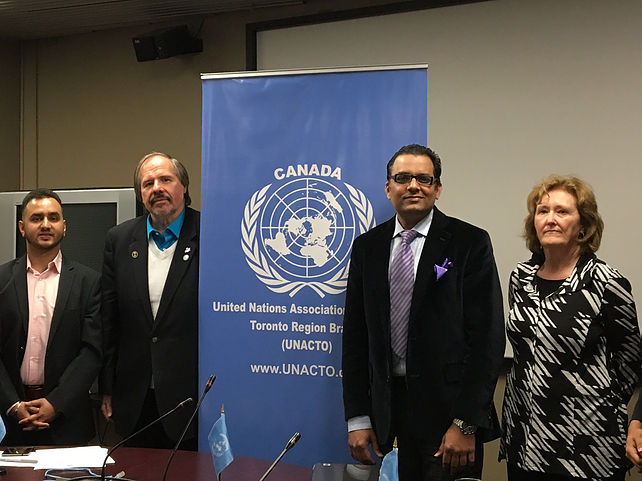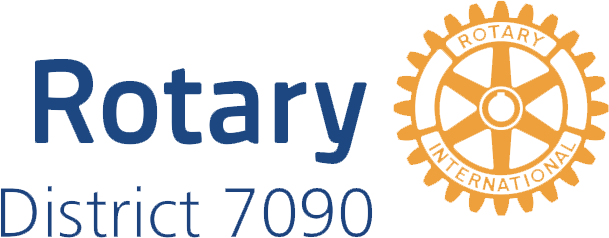More SOWNY E-Club News
Posted by Gordon Crann
UN Recognizes 3 E-Club Members

On February 23, 2017, E-Club of SOWNY (Southern Ontario – Western New York) President Gordon Crann, (second from left) while attending the United Nations Association in Canada Toronto Brach (UNACTO) monthly meeting at Toronto City Hall, was recognized for his and Rotary’s humanitarian work by joining guest speaker Nancy Drynan, Canadian Cancer Society’s Durham Representative for South Central Ontario Regional Advisory Council, in receiving an United Nations Association in Canada (UNAC) pin from UNACTO President Syed Khusro and UNACTO Vice-President/Strategy Roshan Udit.
On January 19, 2017, SOWNY Public Relations Chair Albert Kim had attended, along with Zone 24 United Nations Representative PDG Douglas Vincent, the UNACTO’s UN at 71- 17 Goals Gala Dinner promoting UN Sustainable Development Goals at the Versailles Convention Centre in Mississauga. Gordon and Albert are currently following up on a suggestion from PDG Vincent that UNACTO is an organization Rotarians should become more involved in.
Another United Nations organization is currently recognizing E-Club of SOWNY member Howard Weinstein and his internationally award winning social enterprise Solar Ear by featuring them in the following article appearing in the World Health Organization (WHO) Bulletin:
Unlocking the Potential of Health Technology Transfer
Health technology transfer remains under-utilized as a means of making health products more accessible, and, as Gary Humphreys reports, patents are not the main barrier.
When Canadian businessman-volunteer Howard Weinstein arrived in Otse, a village of 3500 people clinging to the edge of the Kalahari Desert in Botswana in 2003, he had just one intention: to bring low-cost hearing aids to the people, especially children.
Only 3% of an estimated 360 million people who suffer from disabling hearing loss have access to hearing aids. "The leading makers of hearing aids charge thousands of dollars for devices that can be produced for as little as US$40," says Weinstein, who was sent by the World University Service of Canada to see they could be produced cheaper, locally, by people who are deaf.
This idea – making something that is essential to people's health more affordable – is at the heart of most initiatives aimed at transferring health technology to the countries that need it. Such transfer takes a variety of forms, ranging from straightforward licensing agreements enabling already existing factories to go into production, to the transfer of know-how and equipment that allows countries to build the manufacturing facilities required.
Technology transfer can thus play an important role in low- and middle- income countries seeking to make health products, including vaccines, diagnostics, devices and drugs, more accessible to their populations.
"Local production can also give countries a degree of autonomy in the manufacture of drugs, an important consideration in times of crisis such as the outbreak of a pandemic," says Dr Martin Friede, programme leader for WHO's Technology Transfer Initiative, which promotes increased access to health products through the transfer of technology and support for local production.
But despite the obvious benefits conferred, technology transfer is still, broadly speaking, underutilized. One reason is the patents used to protect intellectual property. "The companies that generate new products and new technologies are not always willing to share," says Friede.
Howard Weinstein is also pushing hard to encourage others to copy the Solar Ear, hearing aid that he and his team developed in Botswana. Their design represents a breakthrough in the manufacture of these devices, given that its battery can be recharged via sunlight, household light or using a Nokia cell phone connector using the solar charger which the workers who are deaf invented. Their rechargeable battery cost $1 and last 2-3 years, versus a normal battery which lasts 4-10 days
The Solar Ear is now also being produced in Brazil and, later this year, it will go into production in China, India, Mexico and Singapore.
As for intellectual property, Weinstein's approach is at the very least refreshing.
"We could have patented the Solar Ear in a heartbeat," he says, "but we wanted people to copy us. In fact, if somebody ends up producing a cheaper, better version of the Solar Ear and puts us out of business, we will have attained our objective of giving a child an opportunity to go to a public school. We believe that only through education can you break the cycle of poverty"
